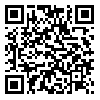Volume 11, Issue 1 (7-2023)
jmsthums 2023, 11(1): 61-74 |
Back to browse issues page
Download citation:
BibTeX | RIS | EndNote | Medlars | ProCite | Reference Manager | RefWorks
Send citation to:



BibTeX | RIS | EndNote | Medlars | ProCite | Reference Manager | RefWorks
Send citation to:
T S, S N, S K. Investigating the causal relationship between metacognitive beliefs and rumination with job burnout with the mediation of emotion regulation difficulty in the employees of Mashhad City Bank in 1401. jmsthums 2023; 11 (1) :61-74
URL: http://jms.thums.ac.ir/article-1-1141-en.html
URL: http://jms.thums.ac.ir/article-1-1141-en.html
1- Islamic Azad University Birjand branch
2- Torbat Heydarieh University of Medical Sciences
2- Torbat Heydarieh University of Medical Sciences
Abstract: (2703 Views)
Background & Aim: Human resources are important and the success factor of organizations, they should be given special attention. The job satisfaction of the employees is the absence of failure to job burnout and disturbance in their personal and social performance, and it ultimately brings benefits to the organizations. In order to increase productivity, organizations pay capital costs to evaluate the annual changes in the job satisfaction of their employees. Therefore, the purpose of this study was to investigate the mediating role of emotional regulation difficulty in the relationship between metacognitive beliefs and rumination with job burnout.
Methods: The above descriptive research is of the correlation type and the statistical population of this study was the employees of banks in Mashhad in 1401, 80 people were considered for each variable, and a total of 320 people were selected by simple random sampling method. The participants responded to Moslesh job burnout questionnaire, DERS emotion regulation problem questionnaire, Nolen Hoeksma and Marver rumination questionnaire, and Wells metacognitive beliefs questionnaire.
Results: The results of the path analysis showed that metacognitive beliefs and hypocrisy increase employee burnout both directly and indirectly through emotional regulation problems. Metacognitive belief such as (positive belief about worry and negative beliefs about uncontrollability and danger in thoughts and cognitive trust and cognitive awareness) with self-harm results of emotion regulation has a significant positive relationship (p=0.05 and r=0.54) such as (cognitive trust and the belief needed to control thought with and cognitive self-awareness) has a significant inverse relationship with perception of emotion regulation (p=0.05 and r=-0.34), as well as ruminative responses with all changes in emotion regulation. It has a positive relationship (p=0.001 and r=0.31) and job burnout with emotion regulation (not accepting emotional responses, damage in performing the target behavior and limited access to emotional and non-emotional regulation strategies) has a significant Direct and weak relationship. (p=0.05 and r=0.24).
Conclusion: These findings confirm The role of metacognitive beliefs and rumination of the individual in reducing the difficulty of emotional regulation is emphasized in order to achieve job burnout.
Methods: The above descriptive research is of the correlation type and the statistical population of this study was the employees of banks in Mashhad in 1401, 80 people were considered for each variable, and a total of 320 people were selected by simple random sampling method. The participants responded to Moslesh job burnout questionnaire, DERS emotion regulation problem questionnaire, Nolen Hoeksma and Marver rumination questionnaire, and Wells metacognitive beliefs questionnaire.
Results: The results of the path analysis showed that metacognitive beliefs and hypocrisy increase employee burnout both directly and indirectly through emotional regulation problems. Metacognitive belief such as (positive belief about worry and negative beliefs about uncontrollability and danger in thoughts and cognitive trust and cognitive awareness) with self-harm results of emotion regulation has a significant positive relationship (p=0.05 and r=0.54) such as (cognitive trust and the belief needed to control thought with and cognitive self-awareness) has a significant inverse relationship with perception of emotion regulation (p=0.05 and r=-0.34), as well as ruminative responses with all changes in emotion regulation. It has a positive relationship (p=0.001 and r=0.31) and job burnout with emotion regulation (not accepting emotional responses, damage in performing the target behavior and limited access to emotional and non-emotional regulation strategies) has a significant Direct and weak relationship. (p=0.05 and r=0.24).
Conclusion: These findings confirm The role of metacognitive beliefs and rumination of the individual in reducing the difficulty of emotional regulation is emphasized in order to achieve job burnout.
Keywords: metacognitive beliefs, rumination, job burnout, emotional dysphoria, emotional regulation difficulty
Type of Study: Research |
Subject:
Special
Received: 2023/01/7 | Accepted: 2023/08/6 | Published: 2023/08/8
Received: 2023/01/7 | Accepted: 2023/08/6 | Published: 2023/08/8
Send email to the article author
| Rights and permissions | |
 | This work is licensed under a Creative Commons Attribution-NonCommercial 4.0 International License. |






